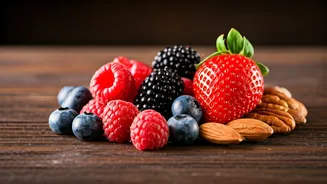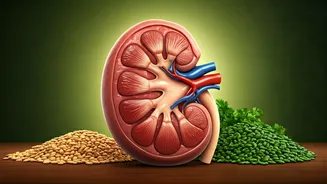Berries: Nature's Cognitive Boost
Berries, like blueberries, strawberries, and raspberries, are packed with antioxidants, vital for protecting the brain from oxidative stress. This stress can
damage brain cells, affecting memory and cognitive function. The antioxidants in berries, particularly flavonoids, improve communication between brain cells, enhancing memory and learning. Research shows that regularly consuming berries can slow cognitive decline and improve memory performance. Adding a handful of berries to your breakfast or as a snack can provide your brain with the support it needs to stay sharp and function at its best. Their delicious taste makes them an easy and enjoyable addition to any diet. So, whether you blend them into a smoothie or enjoy them on their own, berries are a simple yet effective way to nurture your brain health.
Nuts and Seeds: Power Snacks
Nuts and seeds are excellent sources of vitamin E, an antioxidant linked to cognitive health. Vitamin E protects brain cells from damage, helping maintain cognitive function. Walnuts, in particular, are rich in omega-3 fatty acids, crucial for brain health and memory. These healthy fats aid in brain cell function and communication. Seeds like flaxseeds and chia seeds also provide omega-3s, contributing to overall brain health. Additionally, nuts and seeds offer essential minerals such as zinc and magnesium, important for brain function. A small handful of nuts or seeds makes a convenient and nutritious snack, providing sustained energy and supporting cognitive performance throughout the day. Consider incorporating a mix of almonds, walnuts, pumpkin seeds, and sunflower seeds into your daily diet to reap the benefits.
Fatty Fish: Brain-Fuel Powerhouse
Fatty fish, such as salmon, tuna, and mackerel, are abundant in omega-3 fatty acids, especially DHA and EPA, key for brain health and memory. These fatty acids are integral components of brain cell membranes, enhancing cell function and communication. DHA is particularly important for cognitive functions like memory and learning. Regular consumption of fatty fish has been linked to improved cognitive performance and a reduced risk of age-related cognitive decline. Aim to include fatty fish in your diet at least twice a week. If you don't eat fish, consider a fish oil supplement to ensure you're getting enough omega-3s. These nutrients are critical for maintaining a healthy brain and preserving memory as you age. Enjoying fish not only supports your cognitive abilities but also provides a delicious and healthy meal option.
Whole Grains: Steady Energy Supply
Whole grains, such as brown rice, oats, and whole-wheat bread, provide a steady supply of glucose, the brain's primary energy source. Unlike refined grains, whole grains release glucose slowly, preventing sudden spikes and crashes in blood sugar, which can affect cognitive function. The brain requires a constant supply of glucose to function optimally. Whole grains also contain vitamin E and B vitamins, vital for brain health. These nutrients support nerve cell function and help protect against cognitive decline. Incorporating whole grains into your diet helps maintain stable energy levels, supports cognitive function, and promotes better memory. Start your day with oatmeal or choose whole-grain options for your meals to enhance your brain's performance.
Leafy Greens: Nutritional Powerhouses
Leafy green vegetables like spinach, kale, and collard greens are rich in antioxidants and vitamins. They are particularly high in vitamin K, essential for blood clotting and potentially important for cognitive function. These greens also contain folate, crucial for brain health and linked to improved memory and cognitive performance. The antioxidants in leafy greens protect the brain from damage caused by free radicals. Including these vegetables in your diet provides essential nutrients that support brain health and memory. Add them to salads, smoothies, or cook them as a side dish to ensure you get your daily dose of brain-boosting nutrients. Consuming leafy greens regularly is a simple, effective way to support your brain's health.
Avocados: Healthy Fats for Brain
Avocados are rich in healthy monounsaturated fats, beneficial for brain health. These fats support blood flow to the brain, which is vital for optimal cognitive function and memory. Avocados are also a good source of vitamin E, an antioxidant that protects brain cells. The healthy fats in avocados help lower blood pressure, which, in turn, can promote brain health. Additionally, avocados provide lutein, linked to improved cognitive performance. Adding avocados to your diet can provide sustained energy, improve blood flow, and provide essential nutrients for memory and focus. Enjoy them in salads, sandwiches, or as a side dish to reap their brain-boosting benefits.
Dark Chocolate: Pleasure and Brainpower
Dark chocolate, particularly with a high cocoa content, is packed with flavonoids, powerful antioxidants that improve blood flow to the brain. This enhanced blood flow supports cognitive function and memory. Flavonoids in dark chocolate may also help protect brain cells from damage and improve overall cognitive performance. Dark chocolate stimulates the production of endorphins, leading to a sense of well-being, which can also positively influence memory and focus. Choose dark chocolate with at least 70% cocoa content to gain the most benefits. Enjoying a small piece of dark chocolate can be a delicious way to boost your brainpower and satisfy your sweet tooth simultaneously. It's a treat that benefits both your mind and your mood.
Eggs: Nutrient-Rich Brain Food
Eggs are a fantastic source of choline, a nutrient crucial for brain health and memory. Choline is involved in producing acetylcholine, a neurotransmitter essential for memory and communication between brain cells. Eggs also contain other vital nutrients like B vitamins, which support brain function and energy production. Eating eggs regularly can help improve memory and cognitive performance. Include eggs in your breakfast or as a protein source in your meals. Whether you prefer them scrambled, boiled, or poached, eggs are a versatile and nutrient-dense food that supports brain health. Their affordability and ease of preparation make them an ideal addition to your daily diet.
Turmeric: Spice for the Mind
Turmeric contains curcumin, a powerful antioxidant and anti-inflammatory compound that can cross the blood-brain barrier and directly benefit brain cells. Curcumin has been shown to improve memory and cognitive function, potentially protecting against cognitive decline. The anti-inflammatory properties of curcumin also protect the brain from damage. Regularly incorporating turmeric into your diet can help enhance memory and cognitive performance. Add turmeric to your curries, soups, or smoothies. You can also take turmeric supplements, ensuring you choose a product with black pepper to enhance curcumin absorption. The spice is a flavorful way to support your brain health.
Water: Hydration for Clarity
Staying hydrated is essential for overall health, and it's particularly vital for brain function. The brain is about 73% water, and even mild dehydration can impair cognitive performance and memory. Water helps transport nutrients to the brain and remove waste products. Drinking enough water supports focus, alertness, and memory. Ensure you drink enough water throughout the day, especially before engaging in mentally demanding tasks. Carry a water bottle and sip on it regularly to stay hydrated. Consider adding fruits or herbs to your water to make it more appealing. Proper hydration is a simple yet powerful way to support brain health and enhance memory.













